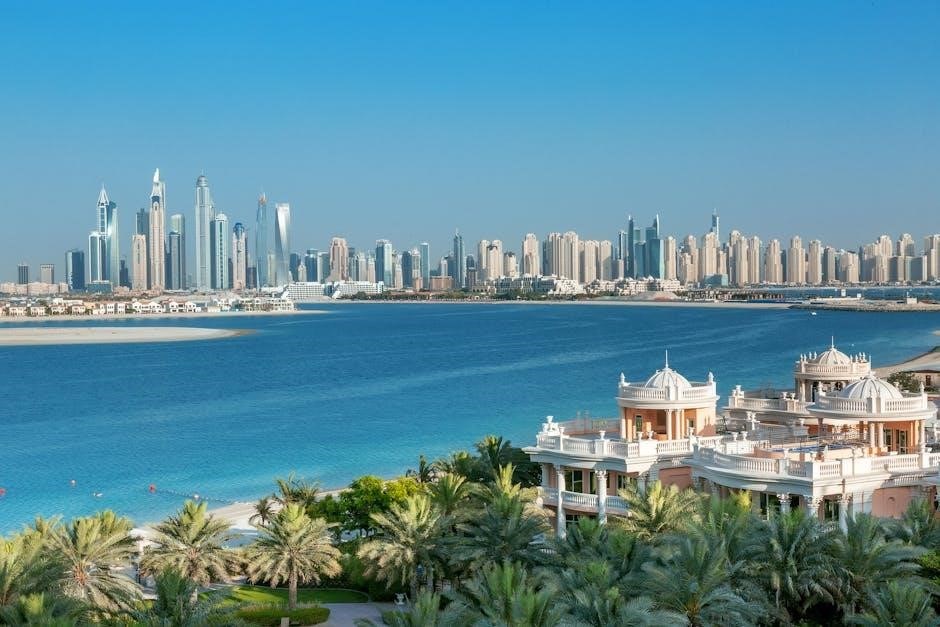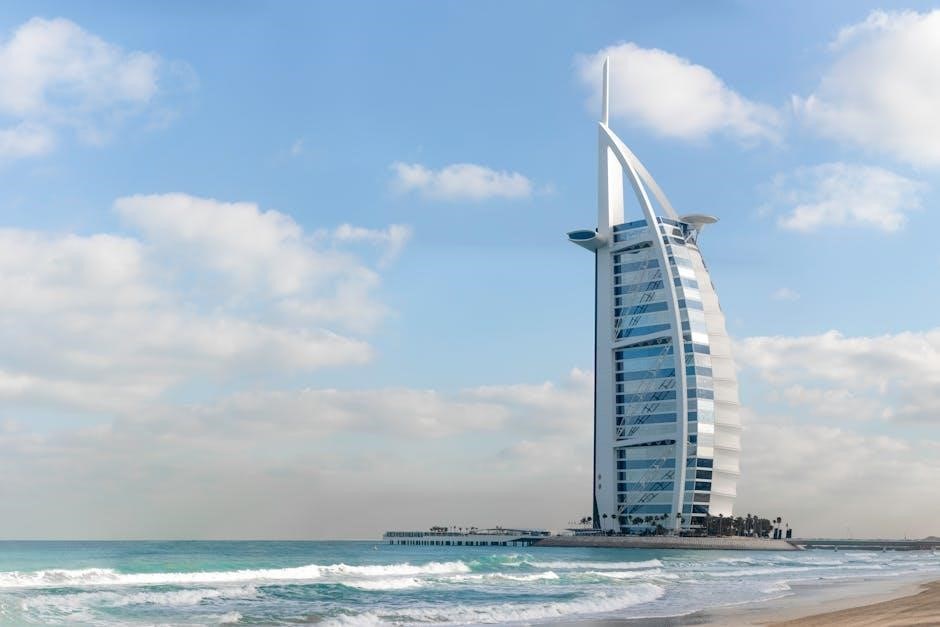The Dubai Leaks PDF exposes a vast network of illicit financial activities, revealing property ownership details of high-profile individuals and organizations involved in money laundering and corruption․

Overview of the Dubai Leaks Scandal
The Dubai Leaks scandal refers to the unauthorized release of sensitive documents, collectively known as the Dubai Leaks PDF, which exposed widespread illicit financial activities in Dubai’s property market․ These leaked documents revealed extensive details about property ownership, shell companies, and suspicious transactions involving high-profile individuals and organizations․ The leak shed light on how Dubai’s real estate sector was exploited for money laundering, tax evasion, and other illegal activities․ It also highlighted the involvement of international figures, including politicians, business leaders, and criminals, who used Dubai’s financial system to conceal their assets․ The scandal has sparked global concerns about financial secrecy and the lack of regulatory oversight in Dubai, raising questions about the emirate’s role in facilitating global illicit financial flows․ The Dubai Leaks PDF has become a critical resource for investigators and journalists probing financial misconduct․
Importance of the Dubai Leaks PDF in Understanding Illicit Financial Activities
The Dubai Leaks PDF has proven to be a pivotal resource in uncovering the mechanisms behind illicit financial activities, particularly in Dubai’s real estate sector․ By exposing shell companies, covert transactions, and hidden ownership structures, the document provides unprecedented insights into how individuals and organizations exploit legal loopholes to launder money and evade taxes․ It reveals the interconnected nature of global financial crimes, linking Dubai to international money laundering networks․ The PDF also highlights the role of high-profile figures, including politicians and business leaders, in these schemes․ This information is crucial for policymakers, law enforcement, and researchers to understand the scale and complexity of financial misconduct․ Moreover, the leaks underscore the need for greater transparency and regulatory reforms in Dubai and other financial hubs to combat illicit activities effectively․ The document serves as a blueprint for addressing systemic vulnerabilities in the global financial system․
Background of the Dubai Property Market
Dubai’s property market emerged as a global hub with rapid growth, attracting international investment, but faced challenges like the 2008 crisis and transparency issues highlighted by leaks․

The Rise of Dubai as a Global Real Estate Hub
Dubai’s transformation into a global real estate hub began in the late 1990s, driven by ambitious development projects like the Palm Islands and Dubai Marina․ These mega-projects showcased Dubai’s vision to become a luxury destination, attracting international investors and tourists․ The emirate’s strategic location between Europe, Asia, and Africa made it a prime spot for global businesses and residents․ The introduction of free zones and liberal property ownership laws further accelerated growth, allowing foreigners to purchase and invest in real estate․ Dubai’s real estate boom was fueled by its reputation for innovation, luxury, and tax-free living, drawing in high-net-worth individuals and multinational corporations․ The sector’s rapid expansion created a vibrant market, but also raised concerns about transparency and regulation, which were later highlighted in the Dubai Leaks PDF․
Historical Context of Dubai’s Economic Growth
Dubai’s economic growth is rooted in its transformation from a small trading port to a global powerhouse․ Historically, Dubai relied on its strategic location along the Persian Gulf for trade, particularly in pearls and textiles․ The discovery of oil in the late 1960s marked a turning point, providing the financial resources to modernize infrastructure and diversify the economy․ Unlike other Gulf states, Dubai’s oil reserves were limited, prompting its rulers to focus on creating a business-friendly environment․ Visionary leadership, particularly from Sheikh Mohammed bin Rashid Al Maktoum, played a key role in shaping Dubai’s growth․ The establishment of free zones, world-class infrastructure, and tourism initiatives positioned Dubai as a global hub․ This rapid development, however, also created vulnerabilities, as revealed in the Dubai Leaks PDF, which exposed gaps in financial regulation and transparency․

Key Findings from the Dubai Leaks PDF
The Dubai Leaks PDF exposed illicit financial activities, revealing property transactions, shell companies, and high-profile individuals involved in suspicious dealings, uncovering networks tied to global money laundering schemes․
Details of Property Ownership and Illicit Transactions
The Dubai Leaks PDF provides extensive details about property ownership, revealing widespread use of shell companies and fake identities to conceal true beneficiaries․ It exposes how luxury properties were purchased through illicit funds, often tied to corruption, bribery, and organized crime․ The documents highlight transactions involving millions of dollars, with some properties bought and sold multiple times to launder money․ Many high-profile individuals, including politicians, business leaders, and criminals, were found to own multiple properties in Dubai, often through secretive offshore entities․ The leaks also reveal patterns of overvalued transactions, suggesting deliberate attempts to inflate property prices for money laundering purposes․ These findings underscore the systemic abuse of Dubai’s real estate market for illicit financial activities, often with minimal oversight or scrutiny from local authorities․ The documents provide a detailed trail of financial flows, linking Dubai’s property sector to global money laundering networks․
High-Profile Individuals and Organizations Involved
The Dubai Leaks PDF has exposed numerous high-profile individuals and organizations implicated in illicit transactions within Dubai’s property market․ Prominent political figures, billionaire businessmen, and influential leaders from various countries have been linked to secretive property deals․ Many of these individuals used shell companies and offshore entities to hide their identities and disguise the origins of their funds․ Among those named are politicians accused of corruption, wealthy tycoons with ties to organized crime, and multinational corporations involved in large-scale money laundering schemes․ The leaks also reveal how some individuals with ties to terrorism and drug trafficking invested heavily in Dubai’s real estate․ These revelations have sparked widespread concern about the misuse of Dubai’s property market as a haven for illicit activities․ The involvement of such high-profile figures underscores the global nature of the financial misconduct exposed in the Dubai Leaks PDF․

Global Networks and Money Laundering Schemes Revealed
The Dubai Leaks PDF has uncovered extensive global networks facilitating large-scale money laundering through Dubai’s real estate market․ The documents reveal how illicit funds from various countries were channeled into luxury properties, often using complex schemes involving shell companies, fake invoices, and trade fraud․ These networks span multiple jurisdictions, with money flowing from regions like Africa, Asia, and Europe into Dubai․ The leaks expose how criminals exploited Dubai’s lax regulatory environment to clean dirty money, often with the help of local facilitators․ The involvement of international criminals, including drug cartels and corrupt officials, highlights the city’s role as a global hub for financial misconduct․ These revelations underscore the need for stronger international cooperation to combat cross-border money laundering and enhance transparency in financial transactions․
Specific Cases of Notorious Figures Exposed
The Dubai Leaks PDF has exposed several high-profile individuals and entities involved in illicit activities, revealing the extent of their financial misconduct․ Among them are politicians, business tycoons, and criminals who used Dubai’s real estate market to launder millions of dollars․ One notable case involves a former government official from a Central Asian country, who allegedly purchased luxury properties worth tens of millions of dollars through offshore companies․ Another case highlights a notorious drug lord who invested in Dubai’s property market to clean proceeds from illegal activities․ These revelations provide concrete evidence of how Dubai’s real estate sector has been exploited by individuals seeking to conceal their wealth․ The leaked documents also detail how these figures used complex financial structures to obscure their identities and transactions, further undermining global efforts to combat financial crime․

Impact of the Dubai Leaks on Global Anti-Money Laundering Efforts
The Dubai Leaks exposed vulnerabilities in global financial systems, intensifying pressure on governments and institutions to enhance AML regulations and improve transparency in high-risk jurisdictions like Dubai․
Challenges in Combating Financial Secrecy in Dubai
Dubai’s status as a global financial hub has made it challenging to combat financial secrecy, particularly due to its complex legal frameworks and anonymous property ownership systems․ The emirate’s real estate market, often used for illicit transactions, lacks transparency, enabling criminals to hide assets behind shell companies․ Additionally, Dubai’s lenient bank secrecy laws and fragmented regulatory oversight hinder international efforts to trace suspicious activities․ The reliance on foreign capital and the desire to maintain Dubai’s reputation as a financial haven further complicate efforts to enforce stricter anti-money laundering (AML) measures․ These factors create significant obstacles for authorities seeking to uncover and prosecute financial crimes linked to the Dubai Leaks revelations․
Political and Legal Ramifications of the Leaks

The Dubai Leaks PDF has sparked significant political and legal repercussions, challenging the Emirate’s reputation as a secure financial haven․ High-profile individuals and entities implicated in illicit transactions face scrutiny, potentially leading to loss of public trust and political fallout․ Governments worldwide may demand greater transparency and accountability from Dubai’s authorities․ Legally, the leaks have exposed vulnerabilities in Dubai’s financial regulatory framework, prompting calls for stricter anti-money laundering laws and enhanced oversight․ There may be challenges in prosecuting cases, especially those involving international parties, due to jurisdictional complexities․ Additionally, the leaks could lead to reforms in property regulations, aiming to prevent future illicit activities and restore confidence in Dubai’s legal system․ These developments underscore the need for robust legal measures to address financial misconduct and uphold the rule of law․
Public Reaction and Media Coverage
The Dubai Leaks PDF has garnered significant public attention and media scrutiny, sparking debates about financial transparency and accountability․ The revelations have led to widespread concern among citizens and investors, questioning the integrity of Dubai’s real estate and financial systems․ Media outlets globally have extensively covered the leaks, highlighting the scale of illicit transactions and the involvement of high-profile individuals․ Public sentiment ranges from shock to outrage, with many calling for greater oversight and reforms․ Social media platforms have been flooded with discussions, demanding accountability from authorities․ The leaks have also raised questions about the broader implications for global financial markets and the need for enhanced international cooperation to combat illicit activities․ Media coverage continues to uncover new details, keeping the issue at the forefront of public discourse․

Solutions and Recommendations
Enhancing transparency, stricter regulations, and international cooperation are key to addressing illicit activities․ Strengthening legal frameworks and accountability measures can help combat financial secrecy and promote integrity․
Enhancing Transparency in Dubai’s Real Estate Sector
Transparency in Dubai’s real estate sector can be enhanced through mandatory disclosure of beneficial ownership and stricter due diligence on property buyers․ Implementing digital platforms to track transactions and ensuring regular audits can help identify suspicious activities․ Collaboration with international authorities to share financial intelligence is crucial to combat money laundering․ Additionally, requiring real estate agents and developers to report high-value transactions to regulatory bodies can deter illicit dealings․ Public access to property ownership records and open data initiatives can also foster accountability․ Strengthening penalties for non-compliance and improving legal frameworks will further deter illegal activities, ensuring Dubai’s real estate market operates with integrity and transparency․
Strengthening International Cooperation to Combat Illicit Activities
Strengthening international cooperation is vital to combat illicit activities exposed by the Dubai Leaks PDF․ By harmonizing anti-money laundering regulations and enhancing cross-border information sharing, countries can effectively track and disrupt global financial networks․ International bodies like the Financial Action Task Force (FATF) should promote standardized frameworks and ensure compliance․ Establishing joint investigative teams and mutual legal assistance treaties can further facilitate cooperation․ Additionally, leveraging advanced technologies like blockchain for real-time transaction monitoring can enhance transparency․ Addressing challenges like differing legal systems and privacy concerns requires creating standardized frameworks and providing incentives for participation․ Stronger international collaboration will lead to more effective detection and prosecution of financial crimes, ultimately reducing global illicit activities․
How to Download and Analyze the Dubai Leaks PDF
To access the Dubai Leaks PDF, visit secure platforms hosting the document and verify its authenticity․ Use PDF readers with search and redaction tools for analysis․
Step-by-Step Guide to Accessing the Leaked Documents
To access the Dubai Leaks PDF, start by identifying reputable whistleblower platforms or investigative journalism websites hosting the document․ Ensure your internet connection is secure, preferably using a VPN for anonymity․ Once on the site, locate the download link or database containing the leaked files․ Verify the document’s authenticity by cross-referencing its contents with credible news sources․ After downloading, use a PDF reader to open the file․ For deeper analysis, employ tools like optical character recognition (OCR) software to extract text or redaction tools to uncover hidden information․ Organize the data chronologically or by key entities to identify patterns․ Exercise caution when sharing or storing the document due to its sensitive nature․ Always prioritize data security and privacy when handling such materials․

Tools and Resources for Interpreting the Data
To effectively analyze the Dubai Leaks PDF, utilize specialized tools and resources․ Start with PDF readers like Adobe Acrobat or online viewers for basic navigation․ For deeper insights, employ data extraction tools such as PDFPlumber or PyPDF2 to parse and export text․ Spreadsheet software like Excel or Google Sheets can help organize and filter data․ Optical character recognition (OCR) tools like Tesseract are essential for scanning and converting image-based texts․ Data visualization tools such as Tableau or Power BI can create graphs to highlight trends․ For advanced analysis, use SQL databases or Python libraries like pandas to process large datasets․ Additionally, consult investigative journalism guides or online forums for tips on interpreting leaked financial data․ These tools collectively enable a comprehensive understanding of the Dubai Leaks revelations․
Future Implications of the Dubai Leaks

The Dubai Leaks PDF exposes extensive financial misconduct, prompting calls for systemic reforms, enhanced oversight, and greater transparency in global financial markets․
Potential Reforms in Dubai’s Financial and Legal Systems
The Dubai Leaks PDF has highlighted systemic vulnerabilities in Dubai’s financial and legal frameworks, prompting urgent calls for reform․ One key area of focus is enhancing transparency in real estate transactions, particularly for foreign buyers and offshore entities․ Stricter regulations on beneficial ownership disclosure could help curb illicit activities like money laundering and tax evasion․ Additionally, Dubai may need to strengthen its legal frameworks to ensure accountability for high-profile individuals and organizations implicated in the leaks․ International pressure could also push Dubai to adopt more robust anti-money laundering (AML) measures, aligning its systems with global standards․ These reforms could redefine Dubai’s reputation as a global financial hub, balancing economic growth with integrity and compliance․ The leaks underscore the need for a more transparent and equitable financial ecosystem․
Long-Term Consequences for Global Financial Markets
The Dubai Leaks PDF has far-reaching implications for global financial markets, potentially reshaping how international transactions are conducted․ The exposure of illicit activities could lead to heightened scrutiny of Dubai as a financial hub, prompting investors and institutions to reassess risks․ This might result in tighter regulations and increased transparency requirements worldwide, particularly in real estate and cross-border transactions․ Stricter AML measures could become more widespread, impacting the ease of global trade and investment flows․ Additionally, the leaks may accelerate the adoption of advanced financial technologies to enhance security and compliance․ Over time, these changes could foster a more robust and transparent global financial system, though at the cost of increased complexity and potential economic slowdowns in affected markets․ The leaks serve as a catalyst for systemic reforms aimed at curbing financial malpractices on a global scale․